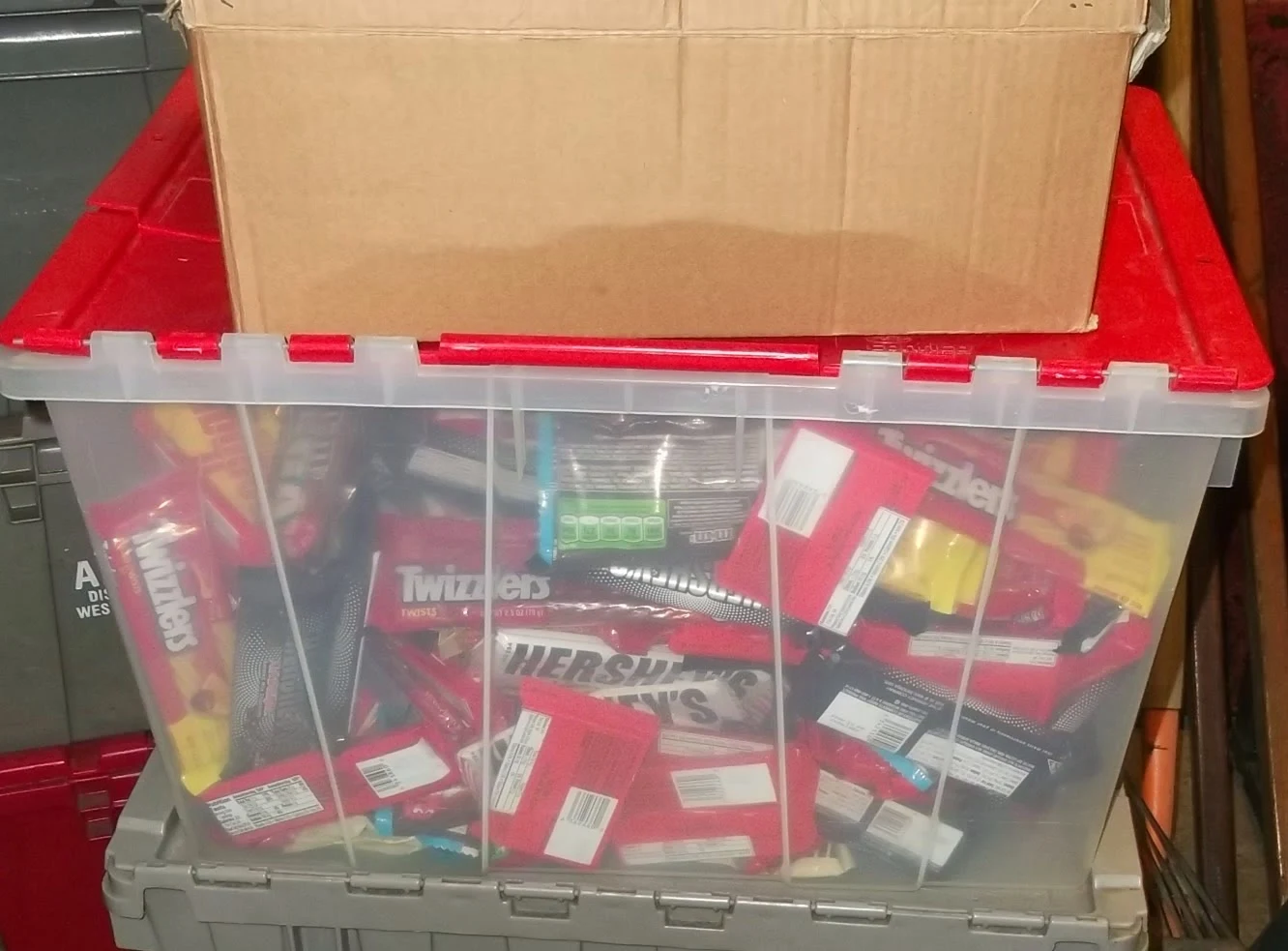57 second clip of Mr Taylor selling a vacuum cleaner.
Steve Taylor, owner of Taylor-Made Auctions (Map) (517-663-3628) has been in the "auction" business for 35 years and has called 5400 auctions. He keeps a log. The footage shown above is from the 5400th auction he called.
Most of his auctions are consignment sales. People who want to clear out a garage, a hobby area or a basement call up Steve and ask him to get-it-gone. Sometimes the items are from a deceased spouse, child or parent. Those items can be too painful to sell at yard or garage sales. Sometimes the people making the consignments are exceptionally busy and they cannot afford to tie up a Saturday hosting a sale.
Mr Taylor gets it sold. That is what auctioneers do.
Why become an auctioneer?
Mr Taylor was in his early thirties. He was working in a shop that fabricated conveyor lines. On weekends he traveled all across lower Michigan with his Country-Western band. He was the lead singer. Every gig, invariably, he was asked to sing "The Auctioneer's Song" by Leroy Vandyke.
He must have been pretty good at singing this song, but he wanted to get better.
One day, his foreman mentioned that a local auctioneer was offering a special deal on "auctioneer school". It was a two week course for $500 (probably $3000 in today's dollars). On a whim, he signed up.
One night, the instructor heard Mr Taylor singing his version of The Auctioneer's Song to his fellow students in the dorm.
The final exam for the course was to sell three items in a public auction house. The instructor was so taken with Mr Taylor's vocal range that he had Mr Taylor take his test last. And before selling his three items, he had Mr Taylor sing "The Auctioneer's Song" acapella to the crowd. Many of the local auction houses had representation at his auction so they could check out the "new talent."
So, do you want to work?
In the middle of the next week, Mr Taylor received a call from a local auction house inviting him to work the coming weekend. Mr Taylor flat-out refused and hung up. He was a singer, after all.
His wife asked him about the phone call. He told her. She asked him if he was working overtime at the shop this weekend. He said, "No." She asked him if the band had a paying gig. He said, "No." She asked if he would be paid to work at the auction house. He said, "I think so."
He called the auction house back and he worked that weekend.
Pride
Pride makes people do funny things.
The head of the auction house handed Mr Taylor his first two items to auction off. It was a pair of pants and a matching shirt. They were grimy, ripped and faded.
Mr Taylor assumed it was a test. More likely, it was a serving of "humble pie" for peremptorily refusing work. The house's minimum bid was $0.50 and these items were so nasty most people would not even want to touch them.
Auctioneers are trained to first toss out a "big" price and then quickly slide down until bidding starts. Some auctioneers like to guess the final selling price and make that their first "price offer" as a "suggestion" of what the item might be worth. An auctioneer can save a lot of time if he gets good at that. Even if nobody bites on the first offer, it stretches the audience's mind and makes bigger prices seem possible.
Mr Taylor did as he was trained. He tossed out $5 as the lead price, even though he knew he would be lucky to get fifty cents. And somebody said, "Yup."
In retrospect, Mr Taylor assumes that the audience knew the back-story...that he was a newbie...that the head auctioneer was sticking it to him a little bit. The audience was being kind. They were not about to let him wallow in humiliation.
The back-up bidder was in the far corner. He bid $5.50. Back and forth it went. Mr Taylor was never able to get them to bid more than fifty cents more that the previous bid.
Mr Taylor worked it and worked it until the bidding stopped. He got $99 for the torn pants and shirt.
The winning bidder scooped up the items, walked over to the losing bidder----and threw the items into the garbage bin.
The two bidders, the lead and the back-up, were mortal enemies. Winning the item had become a matter of personal pride.
The moral of the story is that "intrinsic worth" is a myth, at least on the auction house floor. It is all about the crowd.
So, what does he sell
Short answer, anything legal.
 |
| Sometimes these cars go for $3 each. Sometimes they go for $3 a tray. It just depends upon who is in the crowd. |
 |
| Good food is a consistent seller. He sold these at any two items for $1. The audience lined up and filled their pockets with candy. Then he did it again with "Theater size", two for $1.25 |
 |
| Consignments of clothing show up. Sometimes it is factory over-runs or mis-deliveries that need to be liquidated. |
Sometimes, for reasons beyond his control, delivery of consignments fall through. He is prepared for that contingency. He auctions off his business decorations. It would be very bad if he scheduled an auction and did not have anything to sell.
Mr Taylor buy items that he believes have resale potential and the crowd is not bidding up. He hangs them on the wall as decorations until he needs them. If you listen carefully to the beginning of the first video, you can hear his helper bumping into some wind chimes. Decorations. Back-up stock for sale.
Intrinsic value
As noted before, it is all about the crowd. If you are a buyer looking for a great bargain, small auctions are your huckleberry.
If you are a seller looking for absolute top-dollar, schedule your "stuff" to be sold when there will be high interest items sold. Bigger auctions means bigger crowds. Bigger crowds fuel feeding frenzies and it is more likely that there will be two bidders who decide they just have to "win" that item.
 |
| 1913 SMLE in typical condition |
He agreed that the usually do. But he also pointed out that most people take exceptionally good care of their firearms. Items do not retain value when subjected to the ravages of sun, weather, salt, mis-use, etc.
The picture above shows a firearm built in 1913. It likely saw duty in the trenches of WWI and was probably "sporterized" in the 1950s. It is still functional and rust free because it was stored in a dedicated cabinet, had the fingerprints cleaned off of it after use and was property lubricated with protective products. It is like a million other guns.
How to enjoy an auction
- Ask around. Some auctioneers are more "fun" than others. Mr Taylor (517-663-3628) runs a "fun" auction
- Bring some money. Or have a budget. Don't spend the rent money.
- Do some research before you go. The goal is to find bargains, not to have buyer's regret.
- Don't park anyplace where cattails are growing
- Be courteous.
- Protect your number card. It is the full equivalent of a credit card inside the auction. YOU are responsible for it.
- Have a plan for hauling your wins off-property. It is better to have a friend with a truck lined up ahead of time than to frantically call them at the end of the sale.
Three pieces of advice for new businesses
Mr Taylor's advice to new businesses:
 |
| A customer sold this van to Mr Taylor for $50/month for twenty months. |
You can "make-do" for a surprisingly long time with what you have once you start practicing this. A customer noticed that Mr Taylor's van had many, large holes rusted through it when he came to pick up a consignment. She asked him if he wanted to buy her deceased husband's work van. They worked out a price that was good for both of them.
Avoid credit cards
Credit cards are like Pitcher Plants that trap flies. All the little hairs point downward. You have the illusion of freedom until they finally push you underwater.
Maintain your integrity
There will be times when you are at the mercy of other people's opinion. They can either lean over, extend a hand and pull you out of the mud. Or they can aim a right-smart kick at your head. Their choice will be guided by how you treated clients and customers.
That does not mean that everybody will like you. But you will have succeeded when even those people who do not enjoy your "style" will freely admit, "Steve Taylor never screwed anybody, ever." That commendation is better than money in the bank.
Specific advice if you want to be an auctioneer
Visit as many auctioneers as you can. They all do it a little bit differently. Keep a list of what you like best about each one.
Practice, practice, practice.
Previous small business report
Next small business report


In many states an auctioneer must be licensed, and that licensing bureau takes complaints and polices the auction business. Unethical auctioneers don't last long.
ReplyDeleteI have a friend who is a long-time auctioneer and he says he's sold everything legal, including gold-painted cow patties. His favorite saying "What you lose on the bananas, you make up on the peanuts."
This comment has been removed by the author.
ReplyDeleteThanks for taking the time to discuss this, I feel strongly about it and love learning more on this topic. philatelic auction
ReplyDelete